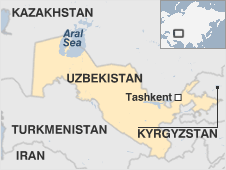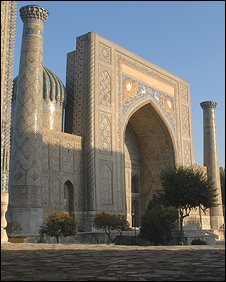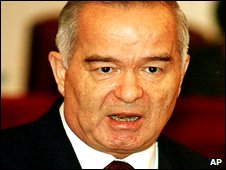 |
In 1991 Uzbekistan emerged as a sovereign country after more than a century of Russian rule - first as part of the Russian empire and then as a component of the Soviet Union.
Positioned on the ancient Great Silk Road between Europe and Asia majestic cities such as Bukhara and Samarkand famed for their architectural opulence once flourished as trade and cultural centres. The country's political system is highly authoritarian and its human rights record widely decried.
Overview
Uzbekistan is the most populous Central Asian country and has the largest armed forces. There is no real internal opposition and the media is tightly controlled by the state. A UN report has described the use of torture as "systematic".
 The ancient city of Samarkand was a major Silk Route trading post
Politics: Long-term leader Islam Karimov tolerates no opposition; political and rights activists have fled. He shows no signs of giving up power
Economics: Uzbekistan is a leading cotton grower. Natural gas is a big attraction abroad. Central control of the economy dates back to the Soviet era. Most people are poor
International: Despite frequent criticism of its poor human rights record Uzbekistan's energy resources and strategic location have led both Russia and the West to seek closer ties.
|
The country is one of the world's biggest producers of cotton and is rich in natural resources including oil gas and gold. However economic reform has been slow and poverty and unemployment are widespread.
Following the 11 September attacks on the US Uzbekistan won favour with Washington by allowing its forces a base in Uzbekistan affording ready access across the Afghan border.
Human rights groups accused the international community of ignoring the many reported cases of abuse and torture.
Since independence the country has faced sporadic bombings and shootings which the authorities have been quick to blame on Islamic extremists.
In May 2005 troops in the eastern city of Andijan opened fire on protesters demonstrating against the imprisonment of people charged with Islamic extremism. Witnesses reported a bloodbath with several hundred civilian deaths. The Uzbek authorities say fewer than 190 died.
Opponents of President Karimov blamed the authorities' brutal determination to crush all dissent. The president blamed fundamentalists seeking to overthrow the government and establish a Muslim caliphate in Central Asia.
The government's reaction to the Andijan unrest prompted strong criticism from the West and relations cooled. In response Uzbekistan expelled US forces from their base and moved closer to Russia with Mr Karimov at one point describing it as Tashkent's "most reliable partner and ally".
From 2008 onwards ties with the West began improving again spurred on by Europeans' search for alternative energy sources in Central Asia and Uzbekistan's strategic importance for the anti-Taliban operation in Afghanistan.
The EU eased sanctions imposed after the Andijan killings and the World Bank reversed a decision to suspend loans to Uzbekistan.
At the same time relations with Moscow became less warm with Uzbekistan in 2009 criticising plans for a Russian base in neighbouring Kyrgyzstan.
President Karimov's uncompromising policies have also at times created friction between Uzbekistan and other Central Asian countries and Uzbekistan has been wary of moves towards closer political integration.
Facts
- Population: 27.5 million (UN 2009)
- Capital: Tashkent
- Area: 447,400 sq km (172,700 sq miles)
- Major language: Uzbek Russian Tajik
- Major religion: Islam
- Life expectancy: 65 years (men) 71 years (women) (UN)
- Monetary unit: 1 Uzbek som = 100 tiyins
- Main exports: Cotton gold natural gas mineral fertilizers ferrous metals textiles motor vehicles
- GNI per capita: US $910 (World Bank 2008)
- Internet domain: .uz
- International dialling code: +998
Leaders
President: Islam Abduganiyevich Karimov
 President Karimov keeps a tight grip on the country
|
Islam Karimov has dominated the leadership since 1989 when he rose to be Communist Party leader in then Soviet Uzbekistan. The following year he became Uzbek president and continued in the post after independence.
A referendum held in 1995 extended his term until 2000 when he won the presidential elections unopposed. A further referendum in 2002 extended the presidential term from five to seven years but the expiry of his term in January 2007 went largely unnoticed. He gained another term following elections in December 2007 which opponents dismissed as a sham.
Mr Karimov takes a ruthlessly authoritarian approach to all forms of opposition. The few Western observers who monitored parliamentary elections in 2004 condemned them as having failed to meet international standards and pointed out that all the candidates supported the president.
Mr Karimov has been accused of using the perceived threat of Islamic militancy to justify his style of leadership. Observers say the combination of ruthless repression and poor living standards provides fertile breeding ground for violent resistance in a volatile region.
Mr Karimov was born in 1938 in the central town of Samarkand and is an economist by profession. He held various senior posts in Soviet Uzbekistan including finance minister and first secretary of the Uzbek Communist Party Central Committee.
Media
The state maintains tight control of the media. Despite a constitutional ban on censorship and guarantees of press freedom media rights body Reporters Without Borders said in 2007 that "arrests internment and blocked websites" were routine for journalists.
In the aftermath of deadly unrest in the eastern city of Andijan in 2005 reporters were expelled from the area and foreign TV news broadcasts were blocked. The BBC's coverage of the uprising led to the closure of the corporation's bureau in Tashkent some months later.
Pre-publication censorship of the press by the state was abolished in 2002 but self-censorship is widespread. A 2007 law holds media bodies responsible for the objectivity of their output.
The US-based Committee to Protect Journalists says many Uzbeks rely on foreign sources - including Russian TV the BBC and other broadcasters - as a counterpoint to the stifled domestic news media. The government controls much of the printing and distribution infrastructure.
Private TV and radio stations operate alongside state-run broadcasters. Foreign channels are carried via cable TV which is widely available.
Uzbekistan had around 2.2 million internet users by 2008 according to officials. Reporters Without Borders says the government blocks access to most of the independent websites that deal with Uzbek affairs.
The press
- Khalq Sozi - state-run daily
- Narodnoye Slovo - state-run Russian-language daily
- Pravda Vostoka - state-owned Russian-language daily
- Ozbekistan Ozovi - published by ruling party
- Hurriyat - published by government agency
- Fidokor - organ of pro-government party
- Mohiyat - weekly
Television
- National Television and Radio Company - state-run operates two networks including youth-oriented Yoshlar
- MTRK - private Andijan
- Bagdad TV - private Fergana Region
- Muloqot - private Fergana Region
- Bekabad TV - private Tashkent Region
- Aloqa-AK - private Syrdarya Region
- Samarkand TV - private
- Orbita TV - private
Radio
- National Television and Radio Company - state-run services include youth network Yoshlar
- Ekho Doliny FM - private Fergana Valley Tashkent and Syrdarya regions
- Oriat FM - private
- Radio Sezam FM - private Tashkent Syrdarya Regions
- Uzbegim Taronasi - private Tashkent
- Radio Grand - private Tashkent's first private FM station
News agencies
- Uzbekistan National News Agency - state-run English-language pages
-
Jahon - run by foreign ministry English-language pages
AFRICA | ASIA-PACIFIC | AMERICAS | EUROPE | MIDDLEEAST | SOUTHASIA
Mauritania Mauritius Morocco Mozambique Namibia Niger Nigeria Republic-of-congo Rwanda Sao-tome-and-principe Senegal Seychelles Sierra-leone Somalia South-africa Sudan Swaziland Tanzania The-gambia Togo Tunisia Uganda zambia Zimbabwe Australia Brunei Burma Cambodia China East-timor Fiji Indonesia Japan Kazakhstan Kiribati Kyrgyzstan Laos Malaysia Marshall-islands Micronesia Mongolia Nauru New-zealand North-korea Palau Papua-new-guinea Samoa Singapore Solomon-islands South-korea Taiwan Tajikistan Thailand The-philippines Tonga Turkmenistan Tuvalu Uzbekistan Vanuatu Vietnam Antigua-and-barbuda Argentina Bahamas Barbados Belize Bolivia Brazil Canada Chile Colombia Costa-rica Cuba Dominica Dominican-republic Ecuador El-salvador Grenada Guatemala GuyanaHaiti Honduras Jamaica Mexico Nicaragua Panama Paraguay Peru St-kitts-and-nevis St-lucia St-vincent-and-the-grenadines Suriname Trinidad-and-tobago United-states-of-america Uruguay Venezuela Albania Andorra Armenia Austria Azerbaijan Belarus Belgium Bosnia-hercegovina Bulgaria Croatia Cyprus Czech-republic Denmark Estonia Finland France Georgia Germany Greece Hungary Iceland Ireland Italy Latvia Liechtenstein Lithuania Luxembourg Macedonia Malta Moldova Monaco Montenegro Norway Poland Portugal Russia San-marino Serbia Slovakia Slovenia Spain Sweden Switzerland The-netherlands Turkey Ukraine United-kingdom Vatican Algeria Egypt Iran Iraq Israel-and-palestinian-territories Jordan Kuwait Lebanon Libya Mauritania Oman Saudi-arabia Sudan Syria Tunisia United-arab-emirates Yemen Afghanistan Bangladesh Bhutan India Nepal Pakistan Sri-Lanka The-Maldives

